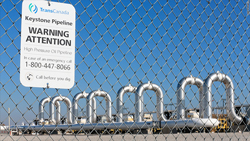As the Oct. 31 deadline for Congress to pass two large infrastructure bills approaches, Pres. Joe Biden is facing pressure from Democratic progressives and moderates alike to pass their respective priorities in his Build Back Better Act (BBB).
By Oct. 31, Congress is poised to either extend the aforementioned deadline or pass a drastically scaled-back package made from the framework of BBB. Originally projected to cost $3.5 trillion, BBB is likely to be approved (if at all) for a far less robust $2.2 trillion or less.
This paring-down of the BBB Act is thanks in large part to moderate Sens. Joe Manchin (D-WV) and Kyrsten Sinema (D-AZ), who have each threatened to vote ‘no’ on the bill if their own priorities are not included, blocking it from passage altogether.
Manchin has publicly explained his opposition to certain facets of the bill. Notably, on Oct. 16, it was reported that Manchin, who represents coal-rich West Virginia, had told the President he is opposed to the BBB Act’s Clean Electricity Performance Program (CEPP), which progressives see as a priority of the bill. It was also reported that Pres. Biden was working on removing CEPP entirely, which angered progressives.
“The Exxon-designed ‘bipartisan’ infrastructure plan worsens emissions, but pairing it w/clean energy in Build Back Better neutralizes BIF’s harm and lets us tackle the climate crisis,” tweeted Rep. Alexandria Ocasio-Cortez. “We cannot afford to gut it.”
Sinema, on the other hand, has been holding her cards very close to her chest when it comes to her priorities. She has been criticized by Democrats for doing the bidding of lobbyists rather than her own constituents, opposing raising taxes on corporations and wealthy individuals.
Another smaller bipartisan infrastructure bill with an estimated $1.2 trillion price also set for the Oct. 31 deadline is expected to pass. This has been dubbed by some as the “hard infrastructure” bill (as opposed to BBB’s “human infrastructure”), and includes provisions for traditional infrastructure like roads, bridges, and sanitation.
“I’m convinced we’re going to get it done—we’re not going to get $3.5 trillion; we’ll get less than that, but we’re going to get it,” the President told reporters in Connecticut. “And we’re going to come back and get the rest.”



